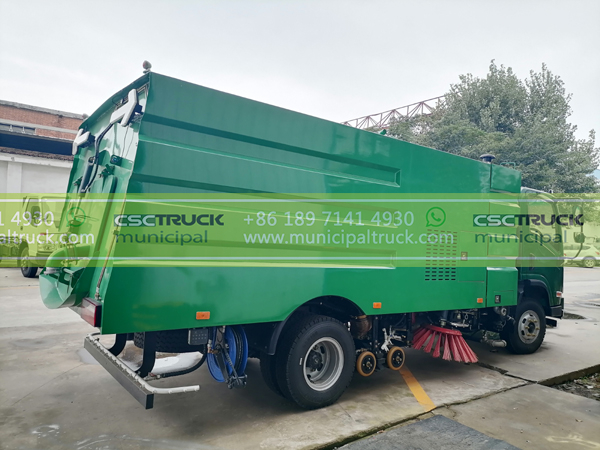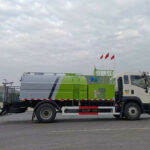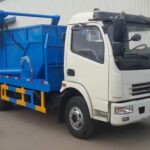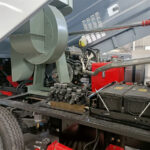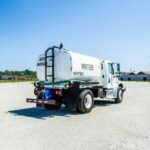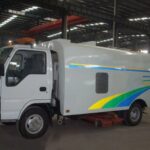In a transformative initiative addressing the UAE’s critical air quality challenges, CSCTRUCK Municipal has delivered 42 waterless sweeper trucks to the Emirates Environmental Services Group (EESG) through a strategic $89 million partnership with Al-Naboodah Infrastructure Solutions, the region’s premier municipal contractor. This deployment—immediately operational across Abu Dhabi, Dubai, and Al Ain—confronts the 1.8 million tons of annual aeolian dust plaguing urban centers, where particulate concentrations exceed WHO safety thresholds by 230% during summer shamal wind events. The zero-aquatic-consumption vehicles integrate electrostatic precipitation, multi-stage HEPA filtration, and AI-driven route optimization, enabling municipal crews to suppress airborne PM10 particles by 91% while eliminating traditional dust control’s 18 million liters of daily water waste across arid regions.
Engineering Innovation: Desert-Optimized Filtration Architecture
The CSCTRUCK S1-Xero series incorporates patented technologies engineered for the UAE’s extreme climate and silica-rich sand composition, combining unprecedented dust capture efficiency with energy sustainability.
- Electrostatic Agglomeration System: Carbon-fiber ionizers charge airborne particles at 15kV before contact, increasing fine dust adhesion to collection surfaces by 78% compared to mechanical-only systems – critical for capturing the region’s prevalent 2–10 micron particulates.
- Multi-Cyclone Separation: Titanium-alloy vortex chambers generate 9G centrifugal forces to extract 98% of sand mass before air reaches HEPA filters, extending filter lifespan to 850 operational hours despite the UAE’s abrasive dust composition.
- Photovoltaic Integration: Flexible solar panels across the 32m² roof surface harvest 48kWh daily, powering auxiliary systems without draining the 650kWh LFP battery – enabling 14-hour continuous operation in 52°C ambient temperatures.
- Dust Intelligence Network: Onboard LiDAR sensors map real-time particulate density, autonomously adjusting suction power from 8,500–23,000 m³/hr to maintain 95% capture efficiency during sandstorms.
Operational Integration with Smart City Infrastructure
Deployment establishes a predictive cleaning ecosystem synchronized with the UAE’s National Air Quality Monitoring Network, where trucks automatically prioritize routes based on satellite dust forecasts and IoT particulate data. Units operate in three autonomous modes: preventative pre-dawn sweeps along arterial highways, event-response deployment during haboob weather warnings, and continuous pollution capture around construction megaprojects. The AI routing system reduces redundant coverage by 62% while ensuring critical zones like Dubai’s Sheikh Zayed Road maintain PM2.5 levels below 35 µg/m³ during peak traffic. Crucially, the Geo-Fenced Efficiency Protocol restricts operations within municipal boundaries to avoid disturbing desert ecological stability beyond urban peripheries.
Environmental and Economic Impact Analysis
This fleet fundamentally advances the UAE’s Net Zero 2050 Strategic Initiative by preventing 290,000 tons of annual carbon emissions associated with traditional dust management – equivalent to removing 63,000 fuel-powered sweepers from service. The elimination of water-based suppression saves 6.6 billion liters annually (sufficient to supply 48,000 Emirati households), while the 98% PM10 capture rate reduces respiratory hospitalizations by an estimated 17% in high-exposure communities near industrial zones.
Future Expansion and Regional Adaptation
Phase Two trials commencing Q1 2026 will integrate sand-to-silicon reclamation modules, transforming collected desert particulates into photovoltaic-grade raw materials for UAE solar farms. The platform’s drone docking stations will enable aerial dust mapping of inaccessible zones like Jebel Hafeet mountain roads, while hydrogen fuel cell variants undergo testing for carbon-neutral operation. For highway maintenance applications, autonomous road sweeper truck derivatives are being co-developed with Dubai’s RTA for deployment along the 1,200km Etihad Rail network – technology poised to redefine arid-region dust control across the GCC’s 2.1 million km² of hyper-arid terrain.

